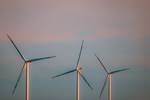ZEBRA project demonstrates closed-loop wind recycling system
Consortium partners have proven the complete recycling of thermoplastic wind turbines via two manufactured wind blades, featuring reduced operating cost, CO2 emissions.
Source | Arkema
The ZEBRA (Zero wastE Blade ReseArch) project, led by the French Institute for Technological Research (IRT Jules Verne, Bouguenais) and supported by Arkema (Cologne, Germany), glass fiber supplier Owens Corning (Toledo, Ohio, U.S.), dismantling and waste processing company Suez (Paris, France), the Canoe (Pessac, France) R&D center, LM Wind Power (Kolding, Denmark) and Engie SA (La Défense, France) for life cycle analysis (LCA), has demonstrated the complete recycling of thermoplastic wind blades.
The project successfully recycled Arkema Elium resin and Owen Corning’s Ultrablade fabrics from wind turbine blades and manufacturing waste, reformulating them back into usable materials. This closed-loop process addresses the growing challenge of end-of-life (EOL) blade management within the wind energy industry.
Each company played a crucial role in the development of the closed-loop recycling process:
- Arkema developed and validated a recycled Elium monomer through thermolysis, achieving a yield of more than 75%. In addition, together with its subsidiary Bostik, an adhesive for the blade assembly that is recycled together with Elium was developed. Arkema says this paves the way for industrial-scale implementation.
- Owens Corning successfully recovered glass fiber at pilot scale, enabling its reintroduction for remelting and reintegration into the production process for the company’s Sustaina product line.
- LM Wind Power manufactured two wind turbine blades with Elium resin and Ultrablade fabrics; one blade includes a large structural element made with recycled Elium resin.
- Suez provided cutting and grinding expertise for processing the blades.
- Canoe R&D center optimized recycling for production and carbon fiber blade waste, additionally developing methods for repurposing waste streams through mechanical recycling.
- Engie conducted a comprehensive LCA, demonstrating the environmental benefits of closed-loop ZEBRA blades and validating their economic viability.
According to partners, the ZEBRA blade’s operating cost, CO2 emissions and recycling investment are significantly reduced.
Related Content
-
Composites end markets: Batteries and fuel cells (2024)
As the number of battery and fuel cell electric vehicles (EVs) grows, so do the opportunities for composites in battery enclosures and components for fuel cells.
-
Polar Technology develops innovative solutions for hydrogen storage
Conformable “Hydrogen in a Box” prototype for compressed gas storage has been tested to 350 and 700 bar, liquid hydrogen storage is being evaluated.
-
Novel composite technology replaces welded joints in tubular structures
The Tree Composites TC-joint replaces traditional welding in jacket foundations for offshore wind turbine generator applications, advancing the world’s quest for fast, sustainable energy deployment.













